Japan Sustainable Seafood Award will recognize individuals, companies, or collaborative projects of the year, for leading the sustainable seafood movement in Japan.
Meet the Finalists
Initiative Award Finalists
An individual or an organization which contributed significantly to expanding the sustainable seafood movement in Japan.
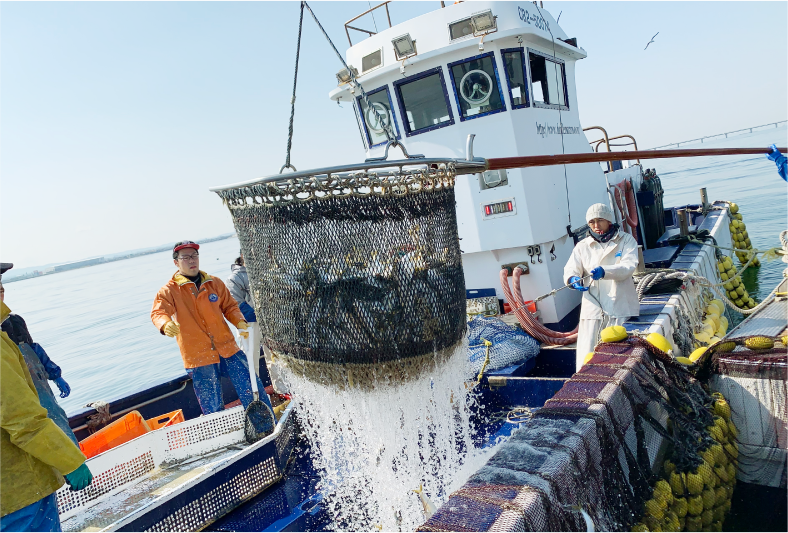
From Japan to the World: “EDOMAE” Project
Kaiko Bussan Co., Ltd. (Daidenmaru Co., Ltd., Nakasenmaru Co., Ltd.)
When you hear the word Edomae, it might conjure up images of Edomae sushi and words related to it such as vigor, delicious fish, and refined.
For us fishermen from Tokyo Bay, it will always be Edomae Tokyo Bay, which is simply the place where we live.
Over the generations, the Edomae fishery industry, which was promoted by the Tokugawa Shogunate and has undergone dramatic growth, has played a fundamental role in the culinary culture of Japan.
The seafood that was presented to the shogunate eventually spread to the people of Edo, and became the root of Edomae sushi. Furthermore, in recent times, after the second world war, the sardines from Tokyo Bay have been a valuable source of protein for the people in the Kanto region.
The Funabashi fishing industry has this history and tradition, but during periods of rapid economic growth, land reclamation and development construction continued, and the fishing grounds became more constricted while simultaneously water pollution by industrial waste became a social issue. As a result of this, the fishermen were driven into a corner and reluctantly had no other option but to go ashore. Because we wanted to dispel notions such as, “Huh? Can you catch fish in Tokyo Bay?” and “Is it possible to eat fish from Tokyo Bay?” we have endeavored with all our might throughout the Showa and Heisei periods.
The moment Tokyo was decided upon as the site of the Olympic Games after Rio, the word “TOKYO” sounded to me like a voice from heaven. Let us extend a warm welcome, first of all to the players, and to event officials and tourists, with Edomae Funabashi Suzugi Shime Sea Bass, a brand we have created over many years!!!
This is what I shouted out, but there were strict food procurement standards in place for that. At that time, I was told about MSC Certification, which was introduced for the first time at the London Olympics. As an “Ecolabel of the sea,” it has recently become visible in various places, but the requirements for it are extremely strict, such as: 1. No over-fishing. 2. Fishing operations should allow for the maintenance of the structure, diversity, and productivity of the ecosystem. 3. Fisheries are subject to a management system that complies with national and international rules.
During the preliminary inspection conducted in 2014, there were several deficiencies in our fishery operation, and certification was a long way off, but we quickly could understand those three principles would become the key that will allow Edomae fisheries to continue for the next hundred years. We promptly started the initiative of “The first FIP (Fishery Improvement Project) developed in Japan,” and at the end of last year, we received Ranking A, the highest ranking in that evaluation process. In other words, the dream of the Tokyo Olympics has been transformed into promotional activities for sustainable seafood in Japan. As a post-Olympic legacy, we will accelerate our activities with the goal of having “EDOMAE” attract attention from around the world.
Kaiko Bussan Co., Ltd. website: https://kaikobussan.com/
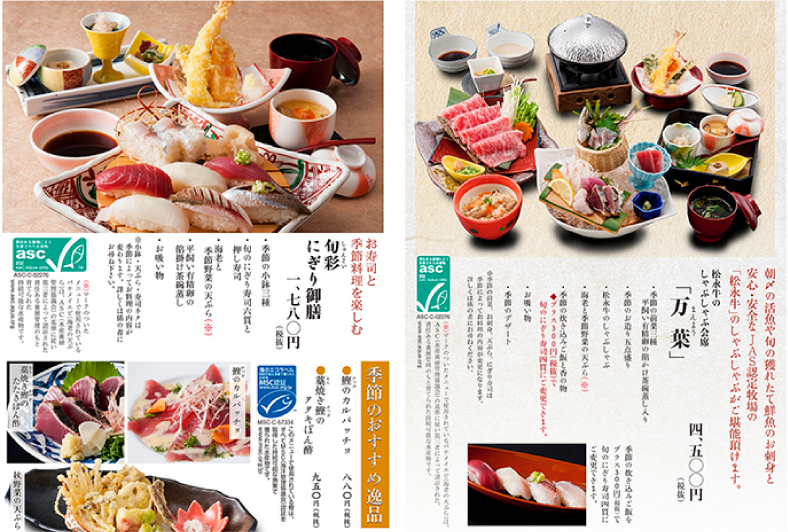
Carry on Japanese Food Cluture and Sustainable and Beautiful Ocean Project
Kijima Co., Ltd.
At Kijima, with the slogan “Delicious Japanese food and an abundant sea, also continuing into the future,” we are active in various developments to have a multifaceted view of issues related to the sea in order to make the sea of Japan sustainable.
As the backdrop where we started our activities, has been local for a long time in places such as Misaki, Manazuru, Matsubara, Sashima, Numazu, in the north in Ofunato, Cape Shiriya, Yagiyu, and in the south in Niihama, Nagasaki, and Hirado, where in the first place in harmony with beaches throughout Japan, we have witnessed the uneasiness felt by many fishermen and various issues with marine resources.
“What can we do at Kijima to leave a bountiful sea for future generations?”
“How can Kijima repay the obligation it has to the sea as a social responsibility for operating seafood restaurants?”
Taking such questions into account, we are undertaking the following initiatives.
-
〇Offering the first Japanese restaurants in Japan with MSC/ASC certified seafood.
In order that our customers can enjoy the flavor MSC/ASC certified sustainable seafood to the fullest, we offer them food that is free of chemical seasonings, various kinds of extracts, preservatives, and artificial coloring and flavoring.
-
〇Promoting the usage of organic/naturally grown farm produce.
The pollution of soil, streams, and groundwater with pesticides and chemicals will ultimately result in pollution of the sea. Kijima believes that the usage of organic/naturally grown farm produce is one of the answers to the question of how to protect the bountiful sea.
-
〇Eliminating synthetic detergent.
We are working on eliminating petroleum-derived synthetic surfactants, which are one of the main causes of marine pollution. We have already switched 75% of all our detergents to soap detergents on an item base and will have done so fully before long.
-
〇Promoting the usage of FSC certified timber resources.
We plan to switch all of the 400,000 chopsticks that are used at Kijima each year to FSC certified ones and are aiming to introduce them partially in all of our restaurants during October. Through the usage of FSC certified chopsticks, we want people to understand that “the sea and forests are connected,” and the staff at all of our restaurants will convey the importance of “protecting the forests for the” by sharing it with our customers.
-
〇Adopting environmentally friendly printing.
We are continuing to make changes, using non-petroleum based ink that is gentle for all people as well as to the environment and FSC certified paper for the printed materials that our customers feel or see at Kijima, as well as using renewable energy.
-
〇Removal of plastic
This year, we switched from disposable plastic straws to paper straws at all our restaurants. During October, we will also change the take-out packaging materials to containers made from paper and wood that are made without any plastic whatsoever.
Kijima Co., Ltd. website: https://kijimagroup.co.jp/reason/about
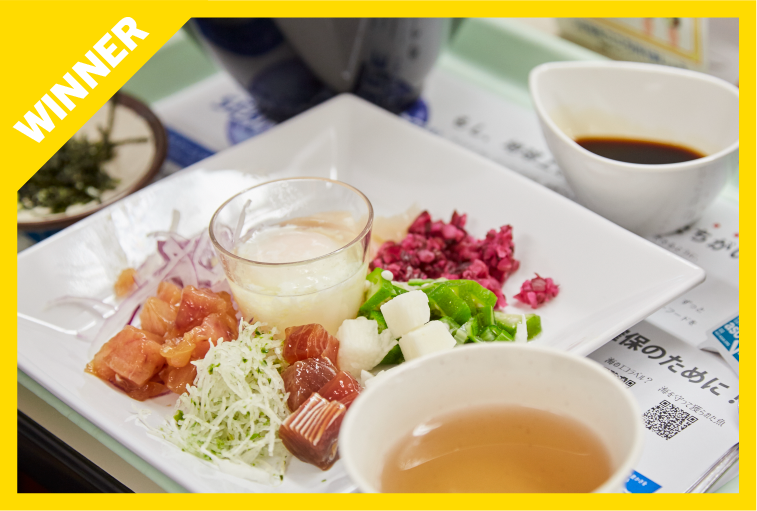
First in Japan: Introduction of Sustainable Seafood for Corporate Cafeterias - Transforming Consumer Behavior and Contributing SDGs from Corporate Cafeterias - Project
Panasonic Corporation Brand Communication Division CSR, Corporate Social Responsibility Department
This activity is an initiative to continuously introduce MSC/ASC certified sustainable seafood to company employee cafeterias, and has been started being offered for the first time in Japan at two locations once a month from March 2018. During the year 2020, the company aims to introduce it to all of its approximately 100 company employee cafeterias.
This “objective of the activity” is, by introducing it into company employee cafeterias, to increase the awareness of employees of, among others, the critical condition of fishery resources, the significance, and importance as a countermeasure against it, and the primary certifications, MSC and ASC, and to contribute to the achievement of SDGs by initiating the selection and purchase of sustainable seafood, not only at the company employee cafeterias but also outside of the company, which is called “transformation of consumer behavior.”
By doing so, in the second phase of the project of this activity (July 2018 to the end of July 2019) they have worked on “expansion of locations for intra-company introduction”, “promoting the expansion of introduction at other companies”, and “general advancement of employee awareness.”
With regard to expansion of locations for intra-company introduction, they have advanced it with “horizontal deployment” to other locations by entrusting it to Aim Service, which was the first catering business in Japan to have received MSC/ASC CoC certification and “A proposal for a new certification and introduction thereof” to other catering companies.
As a result of this, it has been introduced at 9 locations through “horizontal deployment.” Five companies, including Green House, Ai Food Company Limited, Tastipal, Uokuni Sohonsha Co., Ltd., have obtained the “new” certification and have introduced it at 11 locations. (Total 20 locations: Total number of meals served annually: Approximately 3.4 million meals)
Furthermore, CoC certification was obtained at 44 locations nationwide through OIE SANGYO CO., LTD., a major food distributor, becoming a large foundation for the expansion of the introduction of sustainable seafood in the future.
To support the introduction of the expansion at other companies, using various opportunities, such as holding lectures, etc. and meetings are conducted to share know-how individually.
As a result of this, Hitachi, Denso, JXTG Holdings, and others have actually introduced it. Especially at Denso, 1. The development of a new section called DG s inter-company osmosis tool, and 2. The introduction at 6 locations in the short timespan of half a year. Additionally, it is being advanced for further expanded introduction.
For increasing awareness, we worked on initiatives for displays for in company employee cafeterias and distributing awareness pamphlets, thorough awareness by using inter-company e-Learning, and press releases, and it was featured in many newspapers, magazines, web posts, etc. Furthermore, through appearances in various advertising methods, etc., such as video news and web articles in cooperation with advertising departments, etc., we have conveyed information about sustainable seafood to the general public.
Panasonic “Chose to protect the sea!” Expanding sustainable seafood to company employee cafeterias: https://www.panasonic.com/jp/corporate/sustainability/citizenship/environment/sustainable_seafood.html
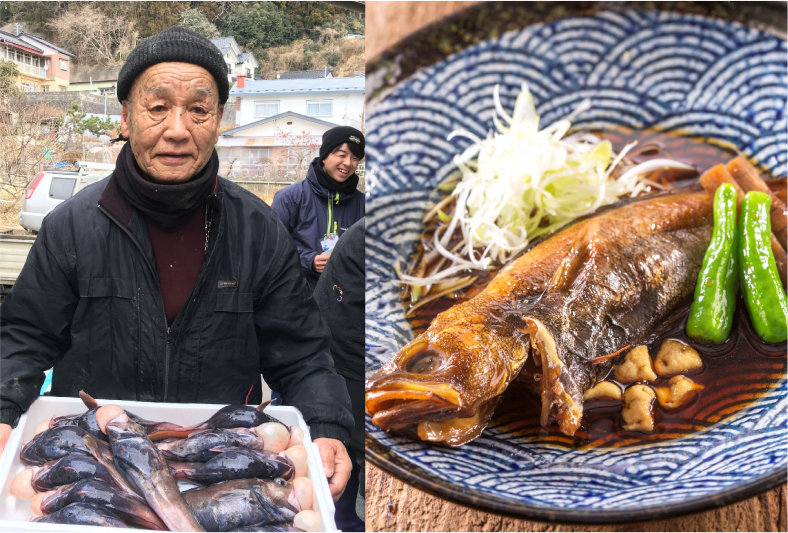
Underused Fish are Delicious! Project
48 (Yonpachi) Gyojo
Based the philosophy of 48 Gyojo, creating fisheries from Japanese pubs, offer seafood directly connected with production areas and fishermen (20 locations in Kanto,) while pursuing the sustainability of the fishing industry, culinary fish culture, and all marine resources.
The “48” in the name “48 Gyojo” is taken from survey results by experts published in an American scientific magazine that said that “with the status quo, it will no longer be possible to catch fish in the wild after 2048.”
For this reason, without regard for brands of species of the fish our company purchases stock directly at fair prices from fishermen who approve of our way of thinking, and our company highly values fish with added value such being kept fresh with great care.
Furthermore, we pro-actively offer “underused fish” that tastes great. This is because, as a business that deals with fresh fish, smoothing out imbalances caused by extreme overconsumption of popular kinds of fish is something that we believe is necessary.
By promoting these kinds of initiatives, we would like to create a future where fishermen are able to make a living, and as a result, eliminates the need for fisheries that do not care about resources.
<A typical example of an underused fish: Dark sleeper>
The dark sleeper, the fish on the signboard of 48 Gyojo, is a fish with an impressive appearance with an air-bladder that comes out due to the air pressure when pulled up from the seabed, and because one of its characteristics is that it is too delicate to be suitable for distribution, it used to be eaten on a limited scale only in some regions such as Tohoku.
However, because it tastes really good, we instructed the fisherman on the method of shinkeijime that maintains the freshness and allows for distribution, and we have branded it so that it sells in Tokyo.
While in restaurants the staff show the fresh fish in the tanks, we would like to let people know that there are fish that are called underused fish, that there are many kinds of fish that are not eaten even they actually taste great, and furthermore, the “tasty reasons” such as such as the efforts and ingenuity of the fishermen.
Last year, the mass of dark sleepers between 300g and 500g that we used was 4.5 tonnes. Because using 13,000 fish that are usually shared by at least two people, even dark sleepers alone had 26,000 people talk about and enjoy underused fish.
With the steady growth until now, we have solidified our image as 48 Gyojo being the place for underused fish. We have also often been featured in the media, and we believe that also by having been able to let people know about all kinds of underused fish, we have made an impact on society as well as on the fishing industry.
Our promotional activities for sustainable seafood simply consist of continuing to increase the number of our fans through our daily business activities.
48 Gyojo website: http://www.48gyojyou.com/
Initiative Award Finalists
An impactful multi-stakeholder collaborative project which took an innovative approach to drive the change in Japan.
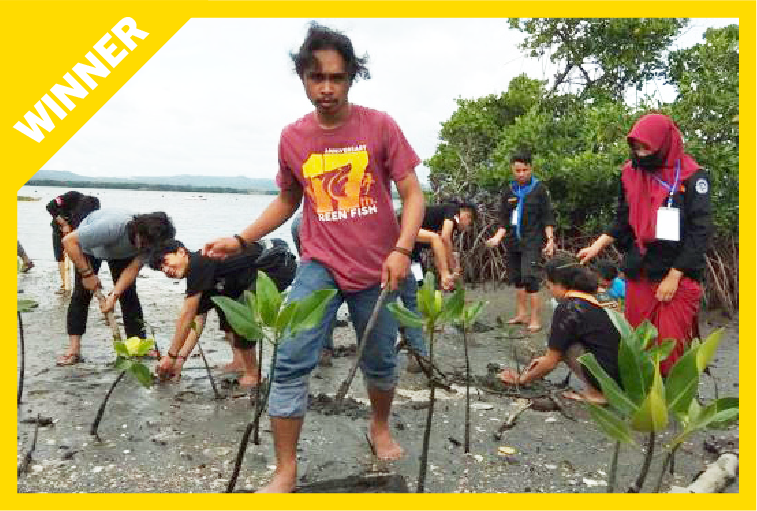
“The Shrimp Farming Improvement Project in Sulawesi Indonesia (AIP) ” Project
The Japanese Consumers’ Cooperative Union, WWF Japan (World Wide Fund for Nature Japan ), BOMAR (PT. Bogatama Marinusa), WWF Indonesia (WWF-Indonesia)
The Japanese Consumers’ Cooperative Union (JCCU) has started the “The Shrimp Farming Improvement Project in Sulawesi Indonesia”” in July 2018 to support the work improving the farming of black tiger shrimps in a sustainable way, based on the standards set out by the ASC (Aquaculture Stewardship Council). The project is a collaboration between the four institutions, the Indonesian company BOMAR (the main customer of shrimp black tiger products to JCCU), WWF Japan, WWF Indonesia and JCCU and it is scheduled to be completed in three years.
The aim of the project is to “protect the ecosystem and the biodiversity” and “establish a livelihood for the local residence and produce and consume marine produce in a sustainable manner”. Its main activities are to revive the mangrove lost through development of farm ponds, creating procedure documents for water quality survey and conducting training, as well as policy advice concerning managing resources of the shrimps.
The project field is a rough fishpond for shrimp black tigers located in Pinrang in South Sulawesi, Indonesia.
<Project members and Tasks>
BOMAR: It will improve the sustainability of its business as the processor. It will provide survey equipment to the producers. It will collaborate and communicate with local officials.
WWF Indonesia: It will design the project and manage the process. It will provide technical support for improvement (ex: reviving the mangrove and providing training for the workers etc.). It will collaborate and communicate with local officials.
JCCU: Develop and provide the product. Work on the processor (BOMAR) to ensure sustainability, provide financial support, and communicate with the consumers and Co-op members.
<Activity update and future works>
We have conducted evaluation on the environmental impact and societal impact and identified the problems that need to be improved by AIP and is working on the project. On the revival of the mangrove, according to the ASC standard, about half of the farming pond which is 28ha out of 56ha is needed to be revived and we have revived 12ha of it which is more than 40,000 mangrove trees by August 2019.
We are still creating the document and conducting training.
It is scheduled to proceed to the main evaluation of the ASC recognition at the farming pond under this project by mid-2020. Additionally, in the future, we are aiming to expand the ASC recognition to other farming ponds.
The Shrimp Farming Improvement Project in Sulawesi Indonesia: (WWF Japan) https://www.wwf.or.jp/activities/basicinfo/3652.html
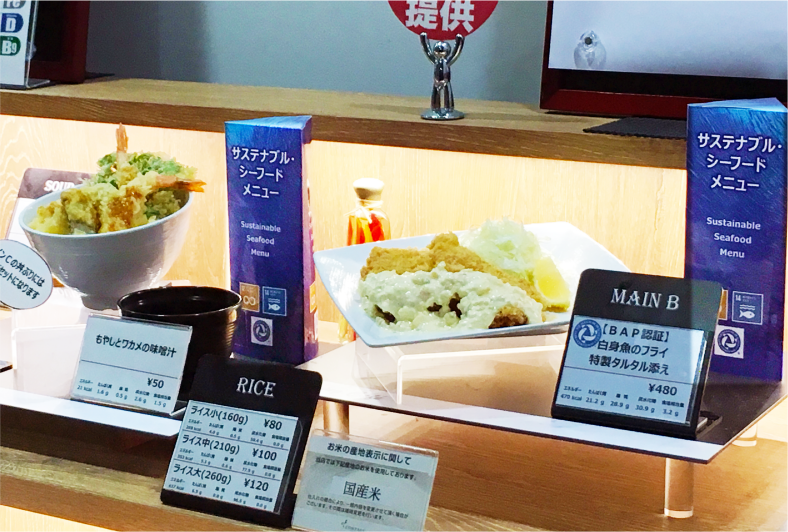
Introducing BAP Certified Seafood at the Hitachi’s Corporate Cafeteria Project
Hitachi Manufacturing Plant, Seiyo Food-Compass Group, Inc.
Hitachi Manufacturing Plant has introduced sustainable seafood (BAP certified) from November 2018 in its office cafeteria at its Ikebukuro office, and providing a menu consisting of recognized ingredients. This is the first example in Japan to acquire and provide marine products obtaining a BAP recognition.
Hitachi Group has clarified the shape of the society which it aims to become in the long term as “low-carbon society”, “resource efficient society” and “harmonized society with nature” and states that this is their “environmental vision”. To accomplish this “environmental vision” and reaching SDGs we are not only working through projects, but we are also working on various volunteer work at several locations. The Ikebukuro office which is the main office of the marine environment business unit, as a volunteer work to “protect the sea”, they considered and started to introduce the sustainable seafood menu with the support of the Seiyo Food-Compass Group, Inc.
Not only are they working on providing a menu using BAP certified ingredients, but they also work on active promotions using the intranet environment which is shared in the group. To be specific, we upload information which one can take back home such as recipes of the real menu and original comic books which one can learn with their child. The recipe has information such as a tip to save time and cooking techniques, with the help of Seiyo Food-Compass Group so that it would be easy to cook at home. Additionally, the comic books have a work sheet attached which compliments its contents and ensures children can complete it with the knowledge learned while having fun and thus useful as an independent free research for the summer vacation. We are promoting the broadening of the contents so that it can make the workers think about “choosing sustainable seafood” even in their daily lives.
Also, there is an increase in contacts requesting detailed information on our activities from outside of the company, and we have other companies who are considering introducing sustainable seafood to have a tour of our cafeteria when the food is offered. Thus, we realize that we are contributing to improving understanding and awareness of sustainable seafood not only within the company, but also outside it.
We will continue to work on spreading awareness of sustainable seafood by utilizing our 300,000 or so of combined staff members in the future.
Introducing sustainable seafood in the office cafeteria at Hitachi (Hitachi Manufacturing Plant): https://www.hitachi.co.jp/New/cnews/month/2018/12/1211.html
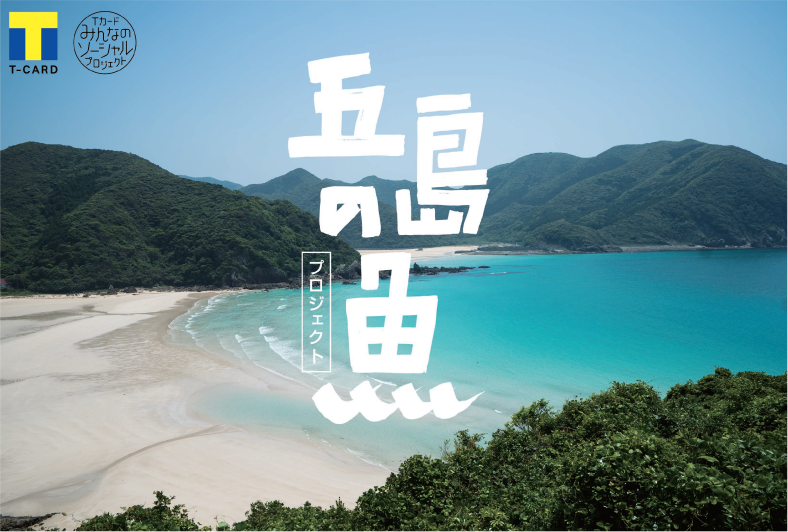
“T Card Everyone’s Social Project” Goto Islands Fish Project
T Point Japan Co., Ltd., Nagasaki Goto City, Hamaguchi Fisheries Co., Ltd., Tsutsuuraura Co., Ltd., Morieda Kan, 12 T members
How to put an appropriate value to the unutilized fish that does not fit the size or is of a miner species and thus are not given value and thrown away?
The project that decided to tackle this issue was the third instalment of the “T-Card Everyone’s Social Project” which challenges the creation of social values by utilizing purchase data through T-Card the “Goto Islands Fish Project”. It was started in June 2018 with the aim of creating a tasty local food by producers and T-Card.
Those working with this project are the representative of consumers of T-members who “have strong opinions on food and likes seafood” who were chosen from more than 69 million T-members based on the lifestyle data on their T-Card, Hamaguchi Fisheries which makes fish paste products from Goto islands, Goto City, chef Morieda Kan who promotes food sustainability, and Tsutsuuraura Co., Ltd. which is a company related to the Agriculture, forestry and fisheries Fund corporation for Innovation, Value-chain and Expansion Japan which supports the sixth industrialization of the primary industry and distribution. The stake holders who have opposing interests such as the locals, consumers, and distributors, cooperates with the aim of creating a better future and they are aiming to start selling their products by mid-November 2019 by combining their knowledge and opinions.
The Goto Islands have a vast variety of fish swimming within its territory due to the warm current of the Tsushima Current which branches from the largest current in the world, the Kuroshio Current at the South West of Kyushu coming into Tsushima. The Goto Islands are rich in fish, but due to the high cost of maintain freshness and the issue of transportation, there are types of fish that are hard to be distributed in the city area. After hearing the needs of those working in fisheries such as the fishermen, the fisheries cooperatives, and the seafood processing companies, it was decided to have the unutilized fish as the main theme of the “Goto Islands Fish Project”.
The locals, consumers, and distributers develop a product which they can all agree on and work on the creation of a continued “sixth industrialization” and give a standard value on the unutilized fish believing that it would lead to sustainable fisheries.
Furthermore, through the project we suggest the utilization and allure of the unutilized fish as a solution and raising the issue of sustainable fisheries by collaborating with the general public and media and spreading information through SNS and holding events.
By simultaneously conducting development and distribution of products, we wish we could contribute to further popularizing sustainable fishing by not only improve understanding and enhance awareness, but by also creating a mechanism enabling consumers to purchase (take action) them.
The HP of the “T-Card Everyone Social Project” Goto Islands fish project: https://tsite.jp/r/tcardsocial/goto/
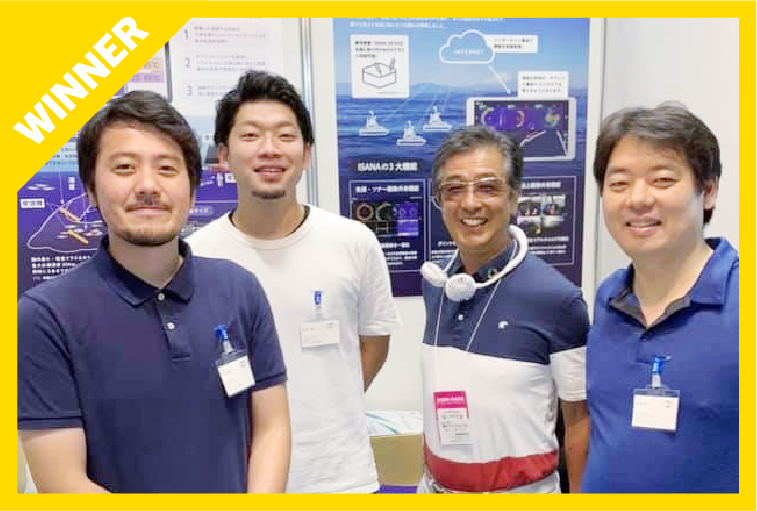
Tokyo Bay Next Generation Traceability System Project
Kaikou Bussan Co., Ltd., Daidenmaru Co., Ltd., Nakasenmaru Co., Ltd., Lighthouse Co., Ltd.
The activity which the Kaikou Bussan Co., Ltd. and Lighthouse Co., Ltd. is working on is the “Establishment of the fist next generation traceability system from Japan which combines the know-how of the fisheries cultivated for a hundred years and most advanced technology”. The data of haul of fish becomes essential when evaluating and managing resources. Furthermore, traceability of the fish haul is ensured by fishermen being easily able to record, analyse, and share such information. Meaning that by being able to communicate the story of “when”, “where”, “who”, “what”, “how”, and “why” it was caught to the distributers and consumers, they can provide an additional value of whether or not this fisheries was sustainable and whether or not it was safe.
Lighthouse Co., Ltd. collects the data of work progress from the ship such as the tracks of the ship route and fishfinder image and sonar images in real times, and through developing the visualizing vessel platform “ISANA” which system they provide to many ships, they have gained the reputation for “making fishing more efficient”. Adding to this, they are developing the system that records the fish haul which is a simple input of fishing data by the fishermen themselves with the aim of it being completed by spring 2020.
This project is a cooperative one with Daidenmaru/Kaikou Bussan Co., Ltd. which has historically conducted seine fishing at Tokyo Bay, and it has attempted experiments by bringing the product inside the ship from December 2018, and it is aiming for the establishment of an easier yet more precise data input environment through constant feedback from the workplace. There was a strong thought to sustainability in fisheries in the Tokyo Bay from the head of both Daidenmaru and Kaikou Bussan Co., Ltd., Ono Kazuhiko. Somebody pointed out the issue that “they were taking notes for the fishing data every time they threw in a net and inputting the data in the Excel work sheet between bad weather, but they wondered if it was not possible to introduce IT or AI technology into this”, and due to this the tech group at the Lighthouse Co., Ltd, with Shindo Katsuki as its lead decided to get involved with “ISANA” as its base. In the future, we are thinking of not only providing support to evaluation and management of resources, but also starting from this, share the data to distributers, retail shops, restaurants, and consumers, and simultaneously keep in mind the block chain, and thus create a truly sustainable brand.
This project will improve the efficiency of the fisheries by increasing fuel and landing, as well as contributing to the evaluation and management of resources and ending IUU fisheries with the establishment of traceability. We think that it could be a new additional value, and consequently broadly contribute to the popularization of sustainable seafood in Japan.
Kaikou Bussan Co., Ltd. HP: https://kaikobussan.com/
Lighthouse Co., Ltd. HP: https://lighthouse-frontier.tech/